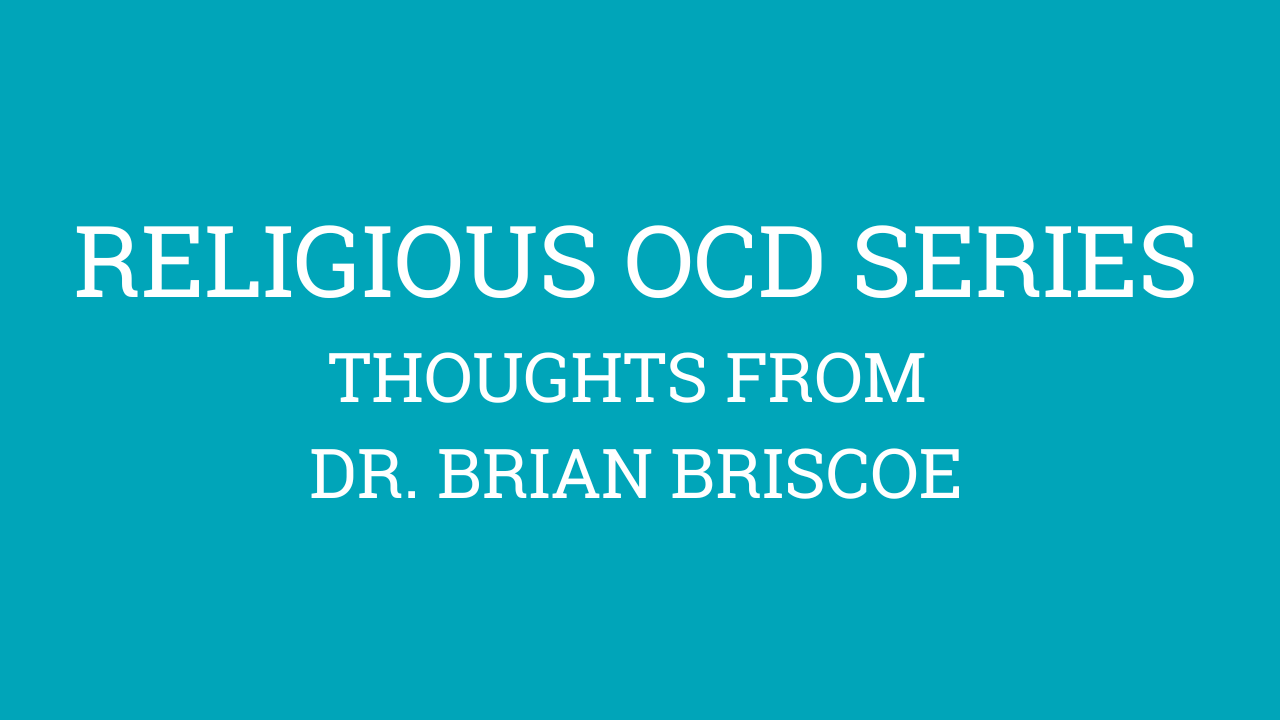
Introducing the Religious OCD Blog Series: A Message from Dr. Brian Briscoe
This article is part of the Religious OCD Series.
As a practicing psychiatrist who holds my Christian faith dear to my heart, I have had the privilege of walking alongside patients through some of their most challenging mental health struggles. In addition to my clinical work, I have served as Chair of the Psychiatry Section of the Christian Medical and Dental Association (CMDA), where I have had the opportunity to collaborate with colleagues who share both clinical expertise and a heart for ministry.
Over many years of practice, and through numerous conversations with colleagues from CMDA, I have recognized a significant gap in both academic literature and church resources addressing Religious OCD, also known as scrupulosity. Despite being a deeply impactful condition, Religious OCD remains largely misunderstood and under-discussed. Individuals who struggle with this form of OCD — along with their families and church communities — often find themselves navigating these difficulties in isolation and confusion.
Why This Series?
- Support individuals who are personally struggling with Religious OCD — offering them hope, understanding, and practical tools.
- Equip pastors and church leaders — helping them recognize and respond wisely to congregants facing these struggles.
- Guide family members and loved ones — enabling them to support their spouses, children, or friends with compassion and understanding.
My Writing Process
Creating this series has been a careful and deliberate process. I began by developing a detailed outline, organizing the key issues that I believe need to be addressed. Then, I wrote down what I felt needed to be communicated based on my clinical experience and expertise, and fleshed out those ideas in rough form. To help craft the initial drafts of each article, I utilized a large language model (LLM), allowing this tool to assist in generating cohesive, structured drafts based on my outlines, content, and direction.
However, this was just the starting point. I approached each draft from the LLM as a sculptor approaches raw stone — carefully chiseling away, refining, and reshaping the material until I found a final product that struck the right balance between clinical accuracy, theological sensitivity, and readability for a lay audience.
Why Use Large Language Models?
The process of writing is time-intensive, involving multiple drafts, careful word selection, thoughtful phrasing, and attention to grammar. As a busy clinician, I simply don’t have the luxury of dedicating that level of time and focus to each article. Still, I remain committed to educating the public on topics that I believe matter deeply.
Large language models have become valuable tools that help transform complex thoughts into structured drafts, assisting with much of the technical refinement. That said, I approached using this technology with some caution. As a history major from a liberal arts college — and the son of an English teacher — I deeply value the craftsmanship of writing. While I miss the time to fully immerse myself in that process, I’ve found that LLMs can be a tremendous aid for busy clinicians, provided we carefully review, revise, and shape the final product to ensure accuracy and integrity.
A Final Word
— Dr. Brian Briscoe
Series Overview
This blog series is designed to be comprehensive and approachable, offering twelve articles that each address a different aspect of Religious OCD. The topics include:
- What Religious OCD Is and Why It Happens
- Understanding Intrusive Thoughts in a Christian Context
- Compulsions in Religious OCD and How They Reinforce Anxiety
- How Religious OCD Affects a Believer’s Walk with Christ
- Biological Treatments: Medication and Supplements
- TMS (Transcranial Magnetic Stimulation) as a Treatment Option
- Exposure and Response Prevention (ERP) Therapy and How It Can Be Adapted for Christians
- Supporting a Spouse Who Struggles with Religious OCD
- How Parents Can Recognize and Support a Child with Religious OCD
- Guidance for Pastors: Recognizing and Responding with Wisdom
- How Small Groups Can Support Members Struggling with Religious OCD
- Moving Forward in Hope: A Final Word
Each article has been crafted to offer clinical accuracy paired with compassionate, faith-sensitive guidance. My hope is that readers will find both clarity and encouragement, whether they are sufferers themselves, loved ones, or church leaders seeking to shepherd well.
For Kentucky Residents
If you live in Kentucky and are seeking support for religious OCD or scrupulosity, our team at Next Step 4 Mental Health in Louisville is here to help. We offer compassionate, evidence-based care—both in-person and through telehealth—for children, teens, and adults.
![]() 502-339-2442
502-339-2442
For Those Outside Kentucky
If you’re not a Kentucky resident, we encourage you to seek care from a licensed mental health provider in your area. Professional support can be a vital step toward healing and peace.
Related Posts
What is Mental Health?
Mental health is the state of well-being in which people understand their own...
Navigating Obsessive Compulsive Disorder (OCD) in a Post-Pandemic World
Obsessive Compulsive Disorder (OCD) affects the brain and behavior and is...


